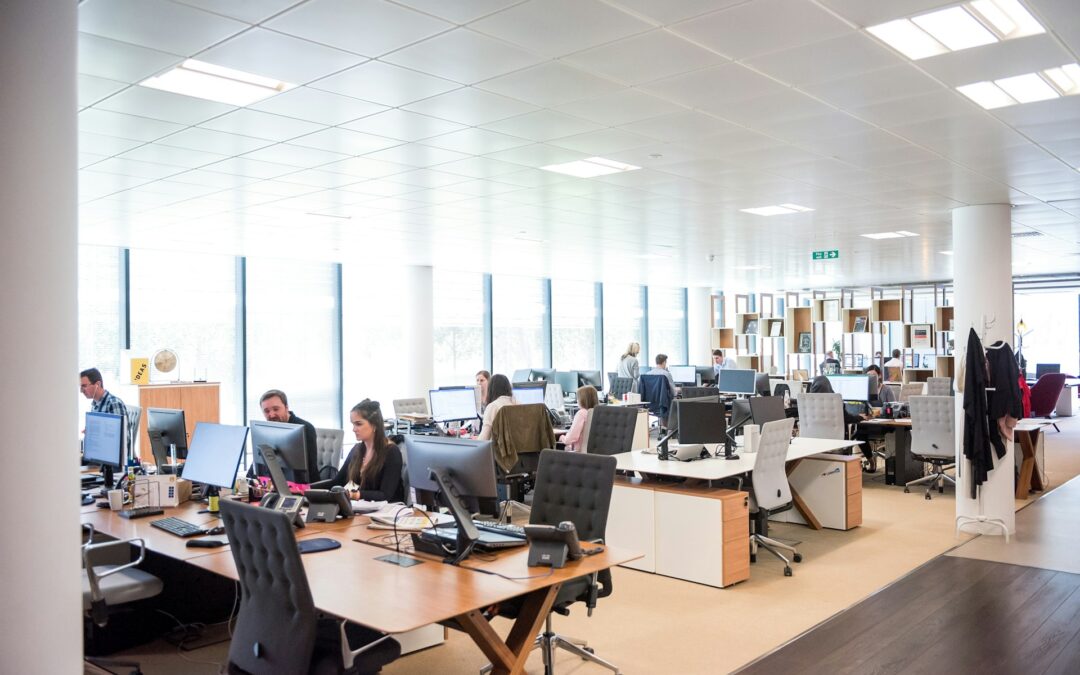A Guide to Hybrid Technology
Workplace ecosystems have changed drastically over the past few years. An increasing number of organisations have embraced the hybrid workplace movement and enjoyed incredible results. Hybrid technology is the bread and butter of the movement and allows organisations to blur the lines between physical and digital spaces.
What’s the secret to successfully transitioning to a hybrid workplace ecosystem? Planning is key. So is understanding the unique needs of your organisation and using this insight to invest in the right infrastructure. This is where hybrid technology comes in.
Allowing employees to work remotely without the right hybrid technology in place can have a devastating impact on performance and profits. Not to mention key growth drivers like employee satisfaction, customer loyalty and the public reputation of your business or charity. Investing in the purpose-built technology from the outset is one of the best ways to avoid teething problems and transition to a hybrid workplace model, without a lag in performance or productivity.
Intrigued? We don’t blame you. Hybrid technology is a fascinating realm and is only set to grow over the coming years. Read on as we take a deep dive into the hybrid workplace movement and how your business or charity can reap the benefits.
What is hybrid technology?
Put simply, hybrid technology is a set of digital tools designed to support location diversity within the workforce. A business with good hybrid technology in place will have the tools to support both inhouse and remote employees.
Hybrid technology empowers staff with the flexibility to work from any location, at any time. The goal is to create continuity between physical and digital spaces and support employees working in both environments.
In a recent report published by McKinsey, analysts found nine out of ten organisations plan to adopt a hybrid workplace model. The movement is here to stay, with executives surveyed predicting employees with roles that don’t require an on-site presence will work remotely up to 79% of the time.
Hybrid technology and digitalisation
Digitalisation is at the heart of a hybrid workplace. In order to be efficient and productive, employees must be equipped with the right digital solutions. This includes platforms that allow them to collaborate and share ideas, information and resources, regardless of physical location.
Now you know more about what hybrid technology is, let’s take a closer look at what you can do to support a hybrid workforce.
Invest in the employee experience
Investing in hybrid technology can drastically improve the employee experience. This has a domino effect and can impact everything from productivity and innovation to employee turnover costs. Below, we cover some of the benefits of how hybrid technology can improve the employee experience in more detail:
- Hybrid technology has an enormous impact on how employees communicate in the workplace. For a hybrid workplace to reach its full potential, employees working in both physical and digital spaces must have the tools to efficiently communicate with each other. This allows employees to collaborate on projects, share ideas and develop an all-important sense of community. The goal is to create a human experience for all employees, whether they’re attending a meeting in the boardroom or tuning in online.
- Employee retention. Why invest in hybrid technology that improves the employee experience? For starters, technology can have a big impact on employee retention. Naturally, all businesses and charities want to hang on to high-performing staff. But did you know that the cost of replacing an employee can be around 26% of their annual salary in the UK?
- Work/life balance. Remote work has been hailed as an incredible solution to improve work/life balance. An increasing number of businesses are using hybrid technology solutions to offer employees the option to work remotely without compromising productivity.
Focus on cybersecurity solutions
The transition to hybrid workplaces has highlighted the need for watertight cybersecurity. An increase in the number of employees working remotely and operating in online spaces naturally increases the risk of digital security breaches. Investing in purpose-built technology designed to support hybrid workplaces is one of the best ways to protect your business or charity, especially if you deal with sensitive data.
The latest government stats reveal cybersecurity is a genuine threat to charities, with 87% reporting phishing attempts and 30% targeted by a cyberattack. Security-conscious hybrid technology can help reduce the risk of a breach.
Monitor workplace productivity
Hybrid workplaces present a unique set of challenges when it comes to monitoring productivity. Not all employees are physically present which can make it difficult to assess efficiency and output. This is where hybrid technology steps up. Investing in analytical tools designed to monitor productivity can be a savvy move for businesses, charities and any other organisations looking to improve efficiency in hybrid workplaces.
Expand your talent pool
One of the major benefits of a hybrid workplace is the potential to expand your talent pool. Organisations with a strict office-based policy instantly limit themselves to local talent. This is fine if you operate in a major city like London or Birmingham. But for businesses based in smaller cities or towns, an office-based policy can be restrictive. Hybrid technology gives you the flexibility to hire remote employees without having a negative impact on internal communication.
Save on overheads
Investing in hybrid technology can seem like a big financial step. But ultimately, it allows you to establish and maintain highly efficient and productive remote workspaces without the need for physical office space.
Hybrid technology and internet connectivity
A fast and reliable internet connection is the foundation of any hybrid technology strategy. Without best-in-class connectivity solutions, you simply can’t reap the benefits of hybrid technology. Below we take a closer look at some of the different connectivity options available:
Fibre internet connectivity
Fibre internet is considered gold-standard when it comes to connectivity. Ideally, you should look for a service that offers download speeds of up to 330Mbps and upload speeds of up to 50Mbps. This is around 20 times faster than ADSL and gives you all the speed and responsiveness you need to use hybrid technology like cloud-based collaboration tools and video conference platforms.
Fibre internet is also more than capable of handling Voice over Internet Protocol (VoIP) communications. User-friendly, scalable and cost effective, VoIP communication solutions are becoming an increasingly popular alternative to landline-based phone systems.
Leased lines
If uptime and security are priorities, leased lines offer total peace of mind. This service gives you a dedicated line reserved exclusively for your data. As well as guaranteeing a fast and reliable connection, leased lines offer a superlative level of security. Speeds and fast and consistent, which means you’ll never have to deal with lags or downtime. Here’s some scenarios where leased lines can be an excellent hybrid technology investment for your charity or business.
- You use cloud-based storage to upload and download large amounts of data.
- You offer virtual services like video consultations.
- You regularly communicate with customers or stakeholders using video platforms.
- You deal with sensitive data and information.
- It’s important for your customer service lines to be open at all times.
- You operate a high-traffic e-commerce store.
ADSL broadband connectivity
Looking for something a little less advanced? Reliable and cost effective, ADSL broadband connectivity is designed to meet the needs of small businesses and charities. Look for products with speeds of up to 17Mbps and no download limits. If basic web browsing, email communications and a reliable VoIP system are all you need, ADSL broadband can be a great solution.
How the VG Group can help you embrace hybrid technology
At the VS Group, we specialise in tailored communications and IT services for businesses and charities. This includes the latest hybrid technology solutions designed to support workplaces with employees operating in both physical and digital spaces.
Our latest Case Study featuring Citizens Advice St Helens offers a glimpse of how we can help your business or charity embrace hybrid technology. Following the pandemic, the organisation was forced to adapt the way it connected with clients and the local community. Charity Connect, our purpose-built VoIP solution helped the Citizens Advice St Helens seamlessly transition to a hybrid working model. Here’s a closer look at the benefits:
- Staff can now work remotely and offer advice and support on demand.
- Calls are made available to multiple users, which significantly reduces call waiting times for clients.
- All employees were issued a Direct Dial In (DDI) number to streamline internal operations. Members of the community also have access to DDIs which improves the client experience.
- Overheads are reduced.
Ready to embrace hybrid technology in your workspace? Get in touch with a customer service agent today to discuss how VS Group solutions can support your hybrid workforce.





